Jane Fonda and Climate Civil Disobedience
Air Date: Week of December 13, 2019
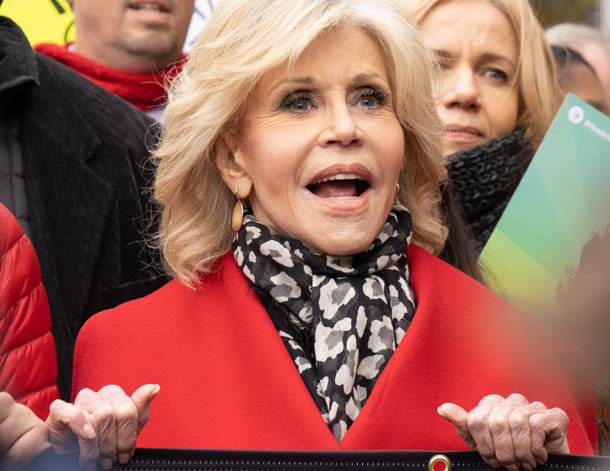
Jane Fonda, even at 81, has been out on the streets of Washington, DC at Capitol Hill every Friday from October to December, protesting inaction on the climate crisis. (Photo: Victoria Pickering, Flickr, CC BY-NC-ND 2.0)
Jane Fonda has been a Hollywood icon for a half-century, is a two-time Academy Award winner, and is currently starring in a hit Netflix show. But in 2019 she wants you talking about the climate. She’s spearheading the “Fire Drill Fridays” protests and, at 81 years old, even spent a night in jail for acts of civil disobedience in these efforts. Famous friends from Ted Danson to Sam Waterston to Diane Lane have joined her in risking arrest and using their celebrity to focus attention on the climate crisis. Jane Fonda joins Host Steve Curwood to discuss her activism and her call for more acts of civil disobedience to confront the planet’s warming.
Transcript
CURWOOD: It’s Living on Earth, I’m Steve Curwood.
Born the daughter of Hollywood star Henry Fonda, Jane Fonda has won two Oscars, seven Golden Globes and the American Film Institute’s lifetime achievement award. She got started on Broadway in 1960, and today she stars in the Netflix series ‘Grace and Frankie.’ But Jane Fonda may be even more famous as an activist, beginning with her protest of the Vietnam War and including her hilarious satirical sendup of sexism in the 1980 movie 9 to 5, where she appeared with Lily Tomlin and Dolly Parton. Now, at 81, she is back at it, this time protesting the lack of climate action on Capitol Hill.
[PROTEST SOUNDS]
CROWD: What do we want? Climate justice! When do we want it? Now!
CURWOOD: Each Friday since October, Jane, along with an army of volunteers, activists, and celebrities, block Capitol buildings and refuse to move when police ask them to leave.
[CROWD CHANTING]
POLICE: If you do not move from the area you will be arrested.
CURWOOD: Jane has been arrested four times and in November spent a night in jail for the first time since her Vietnam protest days back in the 70s. Now when police close in she leaves, as her record and bail conditions would land her back in jail for as many as 90 days, but others with less risk continue to get arrested at the sit-ins. She joins me now to discuss her message and her mission. Jane Fonda, welcome to Living on Earth!
FONDA: Thank you for having me.
CURWOOD: Our pleasure. So in your own words, what are these Fire Drill Friday protests, tell me about the teach-ins that go along with them?
FONDA: Well, I wanted to do something more than I had been doing. I knew the climate crisis is looming, and I decided to put my body on the line and leave my comfort zone and move to DC, and I called Annie Leonard who is the director of Greenpeace USA to help me, and a number of other people in DC who are used to holding protests in DC are working with me. We decided to have an action every Friday, because that's when Greta Thunberg and the student climate strikers are having it. We've claimed Friday and they have, I asked their permission first, and they welcomed me to their Friday protests. And I speak at theirs, and they speak at mine. And I wanted these actions to be teach-ins. But we realized that you can't really, it's hard to go deep at an outdoor rally, so every Thursday evening at seven o'clock Eastern time, we have a proper teach-in where scientists and experts and frontline community representatives go in-depth into the issues, every Friday we focus on a specific issue. For example, this Friday it's going to be migration and human rights. It's been forests, women, oceans, the Green New Deal and so forth. And we speak at length and it lasts about an hour and then we engage in civil disobedience and risk getting arrested.
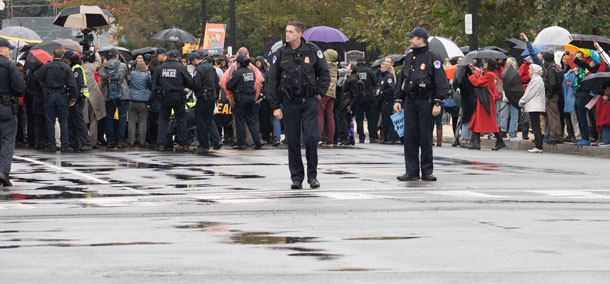
Fire Drill Friday protestors surrounded by police. (Photo: Victoria Pickering, Flickr, CC BY-NC-ND 2.0)
CURWOOD: What inspired you to start the Fire Drill Friday protests?
FONDA: The young student strikers and Greta Thunberg. You know, Greta, she said we have to leave our, our comfort zones and, and do more. I had been doing all the personal individual things -- you know, like driving an electric car and cutting way back on meat and getting rid of single use plastics, but I knew that, while those are important and they're good starting places, it's not the place to stop, that you have to do more. And, you know, I just wondered, well, what, what can I do as a celebrity that will make a difference and Greta was the one that really motivated me to move to DC and engage in civil disobedience. Historically, civil disobedience is a, a noble thing that has changed history, both here in the United States because of the Southern movement, Martin Luther King, the sit-ins at the lunch counters, you know, the bus boycotts, Gandhi and India winning freedom from British colonialism through his nonviolent civil disobedience. It can change things. It changes you as an individual and it can change policy. I recently met with the Senate Task Force on Climate Change. And I said, is there something more or different that I should be doing and they said, do what you're doing, build an army! Make it bigger! We need that pressure from the outside.
CURWOOD: Well, your name is Jane Fonda and so when you do something a lot of us pay attention. How does that feel?
FONDA: I feel very blessed that I have a platform that I have, and a hit TV series Grace and Frankie that, you know, that boosts that platform so that people will pay attention. But I, the important thing is sharing the platform I, I make sure that the people that are standing on that stage with me every Friday and are at the teach-ins on Thursday, are very, very diverse, people who don't often get a big platform for their voices, people from frontline communities, from Lowndes County, Alabama, from a farmer from Wisconsin was there last week, a fisherperson from Maine. We, we try to bring people who don't often have a platform, but who are in the front lines of the climate crisis, who, who are the most impacted. But then we also have scientists who speak to us and people say they're really learning a lot and selfishly, I wanted to do this because I want to learn a lot too. And I am.
CURWOOD: Of course. Now, you've been involved in protesting various issues, going back, what, to the Vietnam War, feminist advocacy, of course environmental activism for all these years. So to what extent does the Fire Drill Friday activism, feel different from those other campaigns?
FONDA: Well, everything is different now. Because we, we've never faced this kind of, of urgency. You know, those of us who have been studying the issue, like you have of climate crisis, realize that it is a real catastrophe. That's what the scientists are telling us: wake up people. It is dire. We have very, very little time to do a truly Herculean task, which is to wean ourselves off of fossil fuel. We have to stop all fossil fuel expansion immediately, so it doesn't make things worse, and then wean ourselves off. By the middle of the century, we have to be totally off fossil fuels. But we have to cut our fossil fuel use in half in the next decade, that's very, very difficult. And we all have to be part of this incredible effort. And the only way to do it is by people in huge unprecedented numbers, mobilizing in the streets and pressuring our governments. And what's so interesting to me is that's what the scientists are telling us. Unprecedented numbers in the streets are what it's going to take. So you know, I thought, okay, if there's a crisis looming, and we only have a decade, then Jane Fonda, with a hit series behind her, the least I can do is role model the next step, which is civil disobedience.
CURWOOD: So how have you or those you love been affected by the disruption in our climate system?
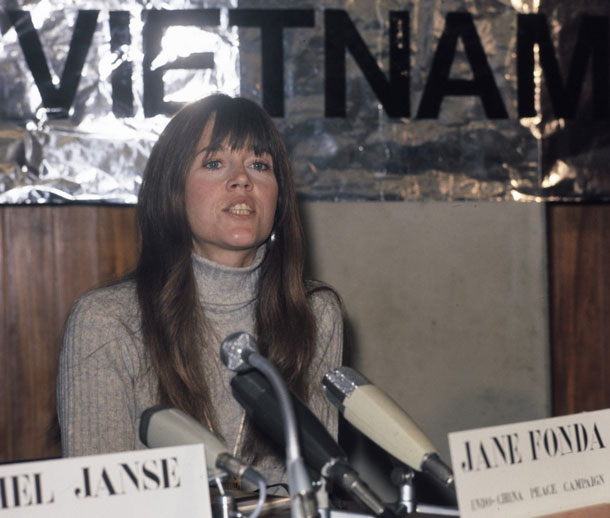
Jane Fonda has been an activist for numerous issues for quite a while, and was involved in protests against the Vietnam War, even being arrested on trumped up charges during a speaking tour against the war in 1970. (Photo: Mieremet, Rob / Anefo on Wikimedia Commons, Public Domain)
FONDA: Well, on a very personal level, I grew up in California. I was born in 1937, there were only 2 billion people on Earth. It's very, very different now, 8 billion people, that changes everything. And because of air pollution and extreme heat, pesticides and destruction of habitat, there are now 2.9 billion fewer birds in North America than there were in 1970. I'm a bird lover. I grew up in the country. In, in, you know, there were hills and valleys and trees and wilderness and birds and animals and wildlife that I grew up in. I feel despair in my body, because of the loss of those things. That's how I personally am impacted. I have a five month old grandson in California. He's impacted because of the fires in his lungs. Parts of California that I love have burned. I'm told the parts of California are going to become uninhabitable. There was a family that just followed me on NPR that live on an island off of Louisiana. They're going to have to choose between staying and drowning with their home, or getting government money to move somewhere else. We carry this in our bodies, all of us -- consciously or unconsciously. Like you, I'm, I am conscious of it. And so I mourn. It's an existential sadness. I have to say, though, that activism is the greatest antidote to despair. After Trump was elected, I was, like so many people, I was completely in despair, and then I went to Standing Rock, and the despair lifted. I just read that Greta Thunberg was so depressed when she saw the magnitude of the climate crisis and the fact that people weren't acting appropriately given it was a crisis. She stopped speaking and eating for a year. It actually stunted her growth. It was the activism of the Parkland students in Florida, that motivated her to do something. And she began her own activism and it lifted her despair. So anyway, I think that answers your question.
CURWOOD: It does. Talk to me about a powerful emotional moment for you during the Fire Drill Fridays.
FONDA: It was a couple of weeks ago, the entire writers room of Grace and Frankie had come and engaged in civil disobedience and gotten arrested, as did the two actors who play my daughters. And one of them, June Diane Raphael -- I did not get arrested because I didn't, I risk going to jail for 90 days -- so I was there when she came out. And she walked up to me and she said, Jane, I cannot tell you what this experience has been to me: I am going to walk into the world a different person now. And that really was very important for me to hear. And then another thing, Sam Waterston, who was here early on, and who was a self described centrist, he had never spoken at a rally much less engaged in civil disobedience and gotten arrested. But he did. And he too, said it was a transformative experience for him. And then last week, what do I see? He got arrested at the Yale-Harvard game.
CURWOOD: [LAUGHS] Indeed.
FONDA: He sent me a picture of himself in handcuffs at the Yale-Harvard game protesting the climate crisis. I mean, look, you know who we were inspired by? The actions that were taken every single day, for more than a year in front of the South African embassy, calling to free Mandela and end apartheid in South Africa. Randall Robinson, that was his idea. Everyday people closed down that Main Street and got arrested, and it worked. It spread around the country. It called attention and it eventually Mandela was let out and apartheid ended and that, that demonstration, played a big role in that. And I think Fire Drill Fridays I hope can as well, in awakening people to what's happening.
CURWOOD: Jane, now what about justice for the people who in years past sacrificed their lives and their communities for the present fossil fuel system? The people who went into the mines? Probably, maybe coal is lighting the room that you're in right now.
FONDA: That's right.
CURWOOD: Yeah and the communities that built up around that. So when, when the mine closes, not only does a miner lose a job, but the tax-base for the school is gone, the community can dissolve. What do we need to do about that?
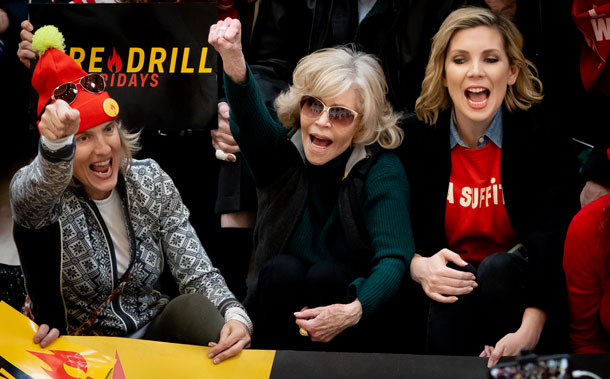
Jane Fonda with June Diane Raphael, her onscreen daughter in the Netflix show Grace and Frankie, to her left. (Photo: Victoria Pickering, Flickr, CC BY-NC-ND 2.0)
FONDA: I think that we have to honor and respect and acknowledge the men and women who helped develop the progress that created this country in a way, the people who sacrificed their health, sometimes their lives, but who spent their lives, providing us with the energy that has fueled progress. And that's why I like the Green New Deal because it says that in the transition from a fossil fuel economy to a clean energy economy, we have to make sure that those men and women are protected, not just trained for new jobs. But while they're being trained, paid union wages, and that the jobs they have pay union wages with good benefits, good pensions that can support them and their families and their communities can thrive again. We can see very clearly what happens when there aren't fair transitions. You mentioned the coal miners, look at what's happening to the former coal miners in the parts of Kentucky and West Virginia where the mines have closed down. There hasn't been a transition. Nobody's even paid any attention to them. They're suffering from black lung and other health problems and their health benefits have been cut. So that's example of what we cannot let happen. The fossil fuel that must be left in the ground is called stranded assets. The workers must never be stranded assets.
CURWOOD: So what do you see as the major obstacles to sufficient action on, on the question of the climate here in the United States.
FONDA: I think number one that people don't understand yet quite enough about the consensus among the scientists. When they do, they tend to stop thinking there's two sides to the story. The fact is, I just found out from a Yale scientist the other day, who studies public perceptions of climate change, there are 25 million people in this country who care enough that they're actually alarmed about the climate crisis, but they're not organized. Why? Because nobody's asked them. So that's a gauntlet thrown at the feet of organizers. We just have to organize. You know, the NRA only has 4 million members, but they're organized. If we can organize the people who do care about this issue, we will win.
CURWOOD: So Jane Fonda, are you going to help organize these people?
FONDA: That's what I'm going to devote the rest of my life [LAUGHS], it's going to be pretty short, but I'm going to do what I can to help organize the people that are needed. The scientists and experts say you only need 3.5% of the population to make policy changes.
CURWOOD: So that's about 9 million people or so, 10 million people could do this.
FONDA: Yeah. But we know that more than that are caring, we just have to get to them.
CURWOOD: What's your big message for the people of your generation on climate disruption?
FONDA: We can't let the young people shoulder the, the burden alone. They are understandably angry and upset that their future has been compromised and maybe even destroyed, the possibility of a living future. And they're angry and they're organized and they're demonstrating, but they're saying we didn't cause this to happen. Join us. So, that's what we're doing. We're saying now us adults, us grandmas in particular, have to, have to join and play our part. It's not our fault that it happened either. It's the fault of the fossil fuel industry, not the workers, but the industry. But, now that we know, we have to do something about it.
CURWOOD: What are we not talking about yet, when it comes to the climate, Jane?
FONDA: Well we're not talking about the climate crisis enough. We're just not talking about it enough. We have to, you know, it's like taxes and religion. People think, well, we can't talk about it at the dinner table, or over Thanksgiving dinner. But let's try. You know, even Uncle Joe who maybe voted for Trump thinks about the grandchildren, thinks about the future, maybe he can be made to care. Just try talking to people about it. Everyone, people in your office, people in the streets, your neighbors, your family. It has to become a topic of conversation. It has to become the norm for us to know this. You know, it's like sitting in a meeting room in your office. There was a time when everyone was smoking, and everybody thought it was normal. Imagine if somebody lit up a cigarette in, in one of those rooms now, they'd be a pariah. Look at that change, that cultural change that happened. We have to cause that cultural change to happen in the context of the climate crisis. Everyone has to be aware of it. Everyone has to be thinking about what they can do, both as individuals and in concert with other people to turn it around.
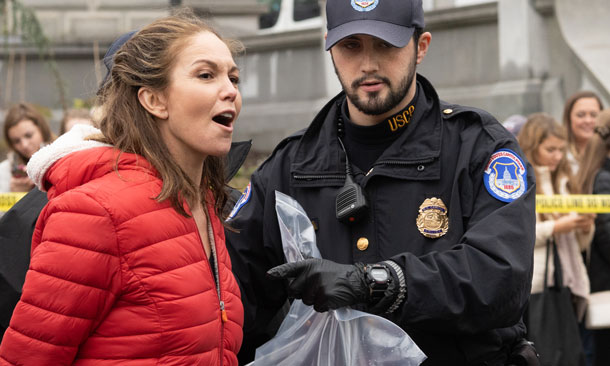
Actress Diane Lane being arrested at the Fire Drill Friday protests. (Photo: Victoria Pickering, Flickr, CC BY-NC-ND 2.0)
CURWOOD: Now, if Bill McKibben were with us, he would point out that we've had a bipartisan agreement in Washington, apparently, over these many years that we've known about climate disruption, to not do anything that would really turn things around. You're there in Washington, what signs do you see that the political system is getting responsive to this, getting responsive enough to the climate crisis?
FONDA: Well, Nancy Pelosi in the middle of the impeachment has gone to Madrid to be part of the COP 25 conference on the Paris Climate Treaty, that's a good sign. I met recently with the Senate subcommittee on climate change. And of course, they are very involved in this and they like what we're doing. I'm not inside the halls of power to really be able to answer your question adequately. I think that there's a reason why the climate Senate Task Force said, keep doing what you're doing, build an army, they need pressure from the outside. There are people that care, including, you know, at least -- see I, I often canvas with an organization called Working America, I go door to door, Scranton, Pennsylvania most recently, and even among Republicans climate is becoming an issue.
CURWOOD: Do they recognize you when you knock on the door?
FONDA: No, they don't. I mean, they have occasionally when I've done it in Modesto, California. Sometimes they recognize me and then fortunately, it's a very positive reaction. But, most of the time they don't know who I am. No, because you know, if someone appears in a way that they're never expected. And there's not an entourage and there's no makeup or anything like that, people tend not to know.
CURWOOD: So, Jane, what's your vision for 2020? As we come now, to the beginning of another year…
FONDA: Mmhmm.
CURWOOD: What are you feeling? What do you thinking? What do you want to say?
FONDA: Activism has to be ramped up a hundred-fold this coming year. Everything hinges on the elections in this country. We have to elect people, not just the president, because every elected official can play some role in addressing the climate crisis. So we have to ramp up our activism. We have to learn as much as we can about the climate science. We have to figure out what we as individuals can do, not as individuals, but within organizations. Don't, don't try to do something on your own. Join organizations that are addressing climate change. Write to your elected officials, get out in the streets, talk to people, make sure that everybody knows that there's consensus among the scientists. There's not two sides to this question, the way the fossil fuel industry would, would like us to believe. You know, it's, they've hired the same people that the tobacco companies hired to sow confusion and doubt among people about the dangers of cigarettes. They're using the same tactics: Well there's two sides. And you know, it's, it works because to ask people to make changes that are difficult. Well, it's hard. And so if somebody is saying to you, you know, it's not really clear that you have to do that, of course, they're going to say, Okay, then I'm not, because it's hard to do.
CURWOOD: [LAUGHS] That's right.
FONDA: So we have to be real clear about the consensus among scientists. I intend to, I'm going back to Hollywood in January to film the last season of Grace and Frankie, but as much as I can, I'm going to continue with my activism including with Fire Drill Fridays. And, even through the election, no matter who gets elected, we have to hold their feet to the fire. You know, back in the ‘30s, Franklin Delano Roosevelt said to the people who were saying "you have to do something, you've got to start these programs that will help us get jobs and earn a living and support our family. You have to do this and this". He said, "I agree with you, now go out and make me do it". So we have to go out and make them do it. Because the task is, as I said before, herculean.
CURWOOD: Jane Fonda is an actor and activist. Thanks so much for taking the time with me today.
FONDA: Oh, thanks for having me. I really appreciate it.
Links
Click here to learn more about Fire Drill Fridays
The New York Times | "Jane Fonda at 81, Proudly Protesting and Going to Jail"
Living on Earth wants to hear from you!
Living on Earth
62 Calef Highway, Suite 212
Lee, NH 03861
Telephone: 617-287-4121
E-mail: comments@loe.org
Newsletter [Click here]
Donate to Living on Earth!
Living on Earth is an independent media program and relies entirely on contributions from listeners and institutions supporting public service. Please donate now to preserve an independent environmental voice.
NewsletterLiving on Earth offers a weekly delivery of the show's rundown to your mailbox. Sign up for our newsletter today!
 Sailors For The Sea: Be the change you want to sea.
Sailors For The Sea: Be the change you want to sea.
 The Grantham Foundation for the Protection of the Environment: Committed to protecting and improving the health of the global environment.
The Grantham Foundation for the Protection of the Environment: Committed to protecting and improving the health of the global environment.
 Contribute to Living on Earth and receive, as our gift to you, an archival print of one of Mark Seth Lender's extraordinary wildlife photographs. Follow the link to see Mark's current collection of photographs.
Contribute to Living on Earth and receive, as our gift to you, an archival print of one of Mark Seth Lender's extraordinary wildlife photographs. Follow the link to see Mark's current collection of photographs.
 Buy a signed copy of Mark Seth Lender's book Smeagull the Seagull & support Living on Earth
Buy a signed copy of Mark Seth Lender's book Smeagull the Seagull & support Living on Earth

